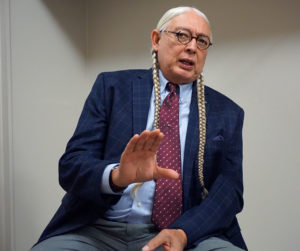
Walter Echo-Hawk spoke before an audience in Akin Auditorium Tuesday, Nov. 13, about cultural sovereignty and the various issues facing Native Americans today.
“Each of these tribes have a cultural sovereignty that goes along with that [the tribal political systems] that is defined internally, which is the ancestral legacy of our cosmologies, our ways of life, our sacred foods, our ways of looking at the land, our art, our music, our ceremonies, our languages, which all total are the inherited legacy of the Native Americans ,which is also I think our contribution to the human family,” said Echo-Hawk
Echo-Hawk acts as an activist as well as a legal representative for the various Native American tribes throughout the U.S.
In past speaking events, Echo-Hawk has said that he believes most Americans to be fair when informed and that the largest issue facing Native Americans today comes from a lack of knowledge possessed by the general public. Echo-Hawk said he hopes to educate people about Native American issues through his speaking and possibly a series of reforms to America’s education system.
“I think that the people that make the curriculums for our public schools should include a healthy dose of American history at all levels, from elementary all the way up through grade twelve, and even into the college curriculums as well; Native American history that is portraying the native peoples and the histories the history they’ve had during the settlement of our country into the modern era,” Echo-Hawk said.
One such issue is religious liberty. According to Echo-Hawk, many Americans don’t believe Native Americans possess a religion, much less one worth legally defending, and this belief is reflected within the legal codes within the US. The largest example of this is the lack of a provision within the first amendment protecting sacred lands, a component of Native American religions.
Another issue Echo-Hawk discussed was the North Dakota oil pipeline.
“The fact that the tribes are standing up to that is part of their cultural sovereignty I guess you could say; to protect their ways of life, their cultural existence, as well as existence period,” Echo-Hawk said.
Echo-Hawk said he believes that the pipeline presents a major threat to not only the tribes, but also to the Great Plains as a whole.
“We had the dustbowl in my grandparents days and now we live in a fracking bowl, but efforts like the Standing Rock Sioux stand that is being taken up their hopefully will enable our peoples to stand up and have a more reasonable policy,” Echo-Hawk said.
















